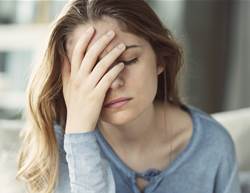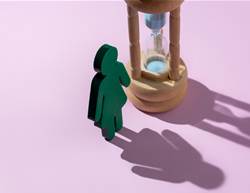If you've been through menopause, are going through it, or, if you've heard anything about menopause at all, then you already know that it's not just a battle against fluctuating hormones - you're also fighting off extra kilos.
All those crazy hormonal changes cause the metabolism to slow and the body to use starches and blood sugar less effectively, says gynaecologist Dr JoAnn Pinkerton.
In fact, she adds, "women with reduced oestrogen levels at menopause gain 6 to 7 kilos between the ages of 45 and 55."
Ready for some good news? There's a lot you can do to shed those pesky kilos, knowing that menopause, at least in part, is to blame.
Catch up on sleep
Sleep disruptions like hot flushes, anxiety and snoring are more likely to occur after menopause, thanks to fluctuating oestrogen levels. According to a US study, 61 percent of postmenopausal women report insomnia symptoms. A study by the Endocrine Society shows that losing as little as 30 minutes of sleep over the course of 12 months can increase obesity risk by 17 percent and insulin resistance by 39 percent.
If you have trouble settling down enough to get 7 to 9 hours each night, try eating bananas or nuts before bed, or speak with your doctor about a supplement. To prevent night sweats, avoid caffeine, alcohol and spicy foods, says Pinkerton, and consider setting up a bedside fan, place an ice pack under your pillow and avoid down comforters, which trap heat.
Get on your feet
After menopause, lower oestrogen levels can leave you feeling sluggish, so you're more likely to be sedentary and miss out on health benefits like a revved up metabolism, improved heart health, increased fat-burning muscle mass, reduction in stress and better sleep quality, says Pinkerton.
She suggests just 30 minutes of exercise three times per week. "That could be 10 minutes three times per day for three days, or 5 minutes six times per day for three days," she says. And while swimming and biking are great for the heart, these activities don't counteract bone loss. "Following menopause, women can lose up to 20 percent of their bone mass," says Pinkerton. So focus on weight-bearing activities that build bone—think walking, hiking, tennis, dancing, or climbing stairs.
Bust stress
"Excessive stress and exposure to the stress hormone cortisol can increase belly fat," says Epel. Unfortunately, the older we get, the more stressed we tend to get. While regular exercise and good sleep hygiene will have a huge impact on how tightly wound you feel, says Pinkerton, consider incorporating calming activities like yoga or meditation into your routine. Or pick up a creative hobby; studies show that the mindfulness and repetition of tasks like knitting and crocheting have serious calming effects.
Stick to mini meals
You might want to reconsider that strict diet, advises Smith. According to her, most women actually gain up to three kilos before starting a restricted eating plan, likely to "prepare" for the deprivation to come. Instead, think of food as fuel. Frequent meals will also keep insulin levels from yo-yoing.
Keep up your calcium
"Weight loss is often associated with bone loss unless calcium intake is increased," says Pinkerton, so to avoid your risk of fracture, be sure you get 1,200 mg per day. Though calcium supplements are available, "dietary sources are best," says Pinkerton. "These include milk, yoghurt, cheese, and leafy green vegetables like kale, spinach and broccoli." Vitamin D also helps with calcium absorption, so don't overlook eggs, butter, liver and fatty fish. You can also get a dose of vitamin D, says Pinkerton, by getting 10 to 15 minutes of sunlight a few days a week.









